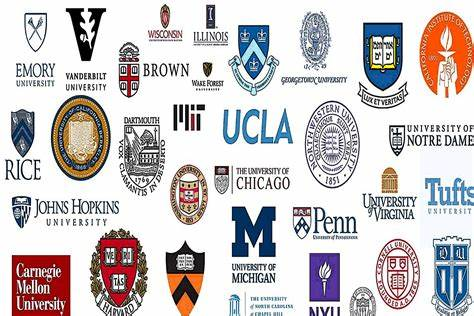The process of college admissions plays a vital role in shaping a student’s academic trajectory as it dictates the institution they will attend and the opportunities presented to them. Nonetheless, the current college admissions system in the United States is far from flawless, with numerous inherent weaknesses that require immediate attention and rectification.
While college admissions may be designed to identify the most qualified and capable students, the process is far from perfect. There are a number of reasons why it can be flawed. It is important for top US colleges and universities to continue to evaluate and improve their admissions processes in order to ensure that they are fair and equitable for all students.

Subjective Standards
The current college admissions process in the United States is heavily reliant on subjective and vague standards. The standards for admission to Ivy League and other top US universities are often mystical, and students are expected to go above and beyond what is considered standard requirements to gain acceptance. This can lead to students being forced to take advantage of outside opportunities and competitions that are not standard barometers for admission. This puts students who have never heard of these competitions or programs at a disadvantage.
Admissions officers are human beings, and as such, they have their own biases and preferences. Even with standardised tests and GPA, there is still a significant amount of subjectivity involved in evaluating an applicant’s personal statement, letters of recommendation, and other application materials. Admissions officers may rely on personal biases or subjective impressions when evaluating an applicant’s essays, recommendations, and extracurricular activities. This can result in some students being unfairly advantaged or disadvantaged in the admissions process.
Reliance on Standardised Tests
One of the main flaws in the college admissions process is the reliance on standardised tests like the SAT, SAT Subject Tests, and AP Exams. While these tests are meant to provide a measure of a student’s academic ability, they are not always an accurate reflection of a student’s intelligence or potential success in college. These exams are supposed to be normalised barometers of admission, but in reality they are simply too easy when tens of thousands of students are getting perfect scores. This makes it impossible to differentiate one student from another based on their test scores alone.
The subsequent level of assessments in the academic hierarchy comprises academic contests and extracurricular endeavours beyond the confines of a classroom setting, which encompass Math/Science Olympiads, national speech and debate competitions, and research contests. Nevertheless, these evaluations lack standardisation as they are voluntary and not mandatory for students, resulting in many students being oblivious to these prospects. Consequently, individuals from underprivileged and lower socioeconomic backgrounds are at a disadvantage.

Importance of Personal Statement
Another flaw in the college admissions process is the importance placed on the personal statement. While academic achievements like test scores and grades are important, the personal statement can make or break a student’s application. This puts students who do not have access to college admissions consultants or essay writing services at a disadvantage. Ultimately, the college admissions process should be a meritocratic system that is transparent and fair. This means using different ways to judge an applicant, including tests and scores, but also a more justified system to determine one’s personality attributes. The current system is fundamentally flawed and needs to be reevaluated to ensure that every student has an equal opportunity to succeed.
There exist several rationales as to why standardized tests may not be the most effective gauge of a student’s capabilities. Firstly, they only appraise a limited scope of skills and knowledge, and may not accurately reflect the student’s aptitudes or shortcomings. Additionally, cultural and socioeconomic factors can significantly impact a student’s performance on these assessments, resulting in them being an unequal measure of a student’s abilities.
Factors outside student’s control
Finally, the college admissions process can be influenced by factors outside of a student’s control. For example, the college application process is often expensive and time-consuming, which can put low-income or disadvantaged students at a disadvantage. Additionally, the prestige of a student’s high school, as well as their family connections and social networks, can play a significant role in their chances of getting accepted to a particular college. The overreliance on subjective and vague standards, standardised tests, and personal statements puts many students at a disadvantage.
Frequent changes in the admissions process
Another reason why college admissions are not perfect is that the process is constantly evolving. As colleges and universities adapt to changes in the educational landscape, they may adjust their admissions criteria or processes, which can make it difficult for applicants to know what to expect. Additionally, the rise of test-optional admissions policies and the increasing importance of extracurricular activities in the admissions process are just a few examples of how the admissions landscape has changed in recent years.
It’s worth noting that the college admissions process is just one part of a much larger educational system that is far from perfect. From unequal access to quality education to the soaring cost of tuition, there are many challenges facing students and families as they navigate the educational journey. While the college admissions process may be flawed, it is just one piece of a much larger puzzle that must be addressed if we hope to create a more equitable and accessible education system for all.It is time to reevaluate the college admissions process and make it more transparent and fair for all students, regardless of their background or access to resources. Only then can we truly create a meritocratic system that rewards the best and brightest students.

Navigate your journey to top US universities with Rostrum
At Rostrum, our mentors are equipped with years of experience and knowledge surrounding the ever changing landscape of college admissions. We understand the nuances of all the difficulties students face and offer assistance in navigating through them throughout the admissions process. With one on one sessions and personalised guidance, we ensure that our students work in the right direction towards their dream universities. For more information, schedule an appointment with our mentors today.
Author
-

An alumnus of the London School of Economics and Political Science and a former consultant at PwC, Yatharth has empowered over 2,000 students from more than 20 countries to secure admissions at top institutions, including those in the Ivy League and University of Oxford and University of Cambridge.
View all posts
